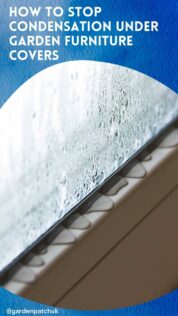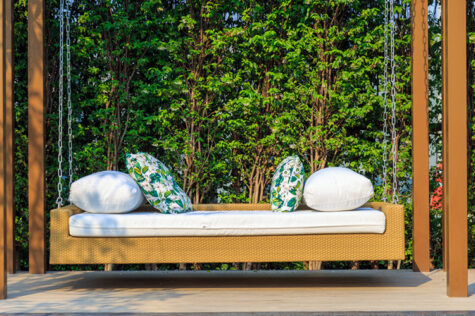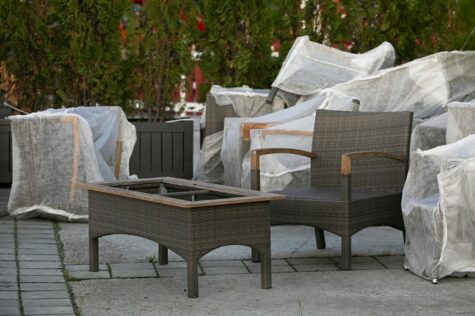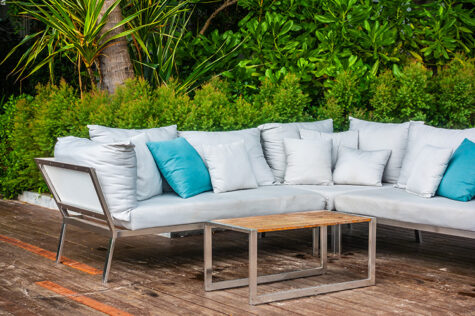Are you looking for a way to protect your garden furniture against weather damage?
Keeping your outdoor furniture safe during rainstorms might sound simple. All you have to do is cover it with waterproof garden furniture covers, right?

Don’t let this happen under your furniture covers. Credit: Shutterstock
Unfortunately, it’s not quite that simple. Let’s take a look at what you’ll need to know to keep your outdoor furniture safe from moisture and stop condensation under garden furniture covers.
Are waterproof furniture covers actually waterproof?
The short answer here is yes, but that doesn’t mean your furniture won’t get wet. Now you might be wondering how exactly waterproof covers fail to keep your furniture dry. Waterproof covers do exactly what they’re supposed to, they keep rain and moisture out. Unfortunately, that’s not all they do. Waterproof covers also trap moisture underneath the covers.
This means that without any airflow, condensation will form underneath the covers which will damage your furniture in time. The condensation that forms can leave water stains and create the perfect environment for mould to grow. This is especially true if your furniture got slightly damp before you covered it up.
To fix or even avoid this problem, look out for the following features when making your next furniture cover purchase. If you don’t want to upgrade just yet, you can also use these tips for a little DIY project that will definitely improve your current furniture covers.
Things to consider when buying garden furniture covers
Just because your waterproof covers cause damage to your furniture, doesn’t mean they are your only option. There are ways around this problem and it is still better to cover your furniture than to leave it exposed completely.
Here’s what you need to look for when buying new furniture covers to avoid the condensation problem. If you’d rather just go for the DIY upgrade, check point 2 for some tips.
1. Look for water-resistant material instead of waterproof material
Waterproof means that no moisture is allowed through the material where water-resistant only repels moisture while still being breathable. This means that waterproof material will trap any moisture inside while the water-resistant material will allow it to evaporate without any harm done.

Waterproof materials don’t let any moisture in or out. Credit: Shutterstock
It is better to choose water-resistant material if you have the option. This way you’ll be sure that no moisture will stay trapped under the cover and thus prevent the pesky condensation problem altogether.
2. Choose a breathable design
The other key to avoiding any moisture under your furniture covers is to choose a breathable design. These covers will usually be a bit more expensive, but they are definitely worth the money.
Breathable covers are designed to let moisture evaporate without letting rain or any moisture in. This usually means that there is a mesh net somewhere on the cover that is hidden by a water repellent piece of fabric. The small opening is usually enough to let any condensation out without letting rain in.
If you want to upgrade your waterproof covers with a condensation problem, you can add the evaporation feature. This means that you’ll have to cut a slit into the sides of your covers, line the area with a straw or piece of wire to keep it open and some mesh. The mesh keeps any insects and debris out while allowing moisture to escape. If you’re worried about water getting in, you can glue on an extra piece of waterproof fabric to overlap the slit you made in the cover.
3. Choose the correct size
One of the most important things you can do before getting new garden furniture covers is to take note of the dimensions of your furniture. If you get covers that don’t fit properly, water may not run off as it should, ending up on your furniture as a result.
Covers that are too big form creases where there shouldn’t be any and will sag in places. This can cause perfect areas for water to gather and since not all material is 100% waterproof, the moisture will eventually leak through onto your furniture. Covers that are too long tend to gather dirt and moisture at the base of your furniture. As this moisture evaporates, there is a better chance of it getting trapped under the cover causing problems like mould.

Make sure garden furniture covers fit properly. Image credit: Whitestores
4. Make sure the inside of the covers is lined with a soft material
This isn’t that important to protect your furniture against moisture, but it will definitely help to prevent damage. A soft cloth backing will prevent any unnecessary scratches as the cover is put in place, removed and whipped around by strong wind.
5. Make sure the covers can be secured
It is very important that your covers can be secured in place. Strong wind has a way to get underneath covers and will manage to rip them off if given the chance. Securing your covers to your furniture will prevent this from happening.
FAQs
What is the best material to cover outdoor furniture?
Polyester is the preferred material when it comes to creating outdoor furniture covers. This material is durable enough to withstand rain and snow.
What is the best way to protect your garden furniture?
The best way to protect your outdoor furniture is to bring it inside. If that’s not an option, garden furniture covers are the next best thing.
Can I use a tarpaulin to cover garden furniture?
Yes. A tarpaulin can be used to redirect rain away from your patio. You can also secure it over your furniture to keep it dry. Just make sure to remove it as soon as the rain has passed to prevent condensation build-up under the tarp. Tarps are not designed to allow evaporation of trapped moisture.

Save this pin for later





What brand do you recommend?
Hi Linda, there are so many to choose from! Kettler and Dokon are good options.